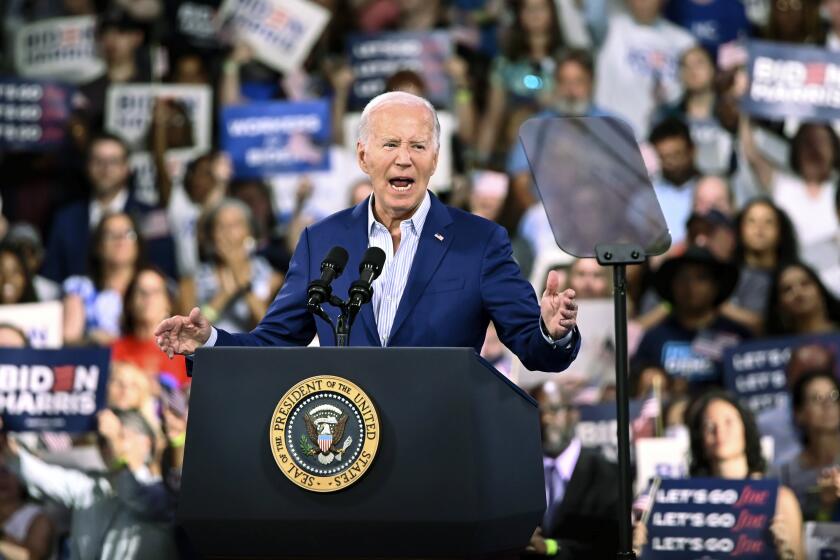Column: What too many Republicans still don’t understand about Donald Trump’s agenda

Donald Trump isn’t normally thought of as a consensus-builder, but in one sense that’s exactly what he is. Many of Trump’s most ardent fans and foes alike believe he is the leader of a political movement with a clear and defined set of principles and goals. They disagree only on whether that agenda is good or bad.
The tendency to cast Trump as a tool of the ideological right serves the purposes of both sides. The right needs to believe Trump is a warrior for its causes to justify its support for him, and the left wants to believe the same to justify its opposition.
I’ll concede that this is not an outlandish view. It’s certainly how he ran in 2016, when he promised in many respects to be an instrument of the Republican base’s will. He even quite brilliantly agreed to a list of potential Supreme Court appointments compiled by the Heritage Foundation and the Federalist Society to reassure skeptical conservatives that he would be their servant. And since he left office, Trump has frequently told right-wing groups that he remains their loyal champion. So maybe you can’t blame people for believing him.
Florida Sen. Marco Rubio recently advocated for industrial policy, the sort of state intervention in the economy that was long anathema to conservatives.
Or maybe you can. While the notion that Trump is an ideological conservative isn’t outlandish, it is outdated. It’s certainly true that if Trump is reelected, he will do things that please the GOP and conservatives. But let’s not get the causality backward: His supporters will like what he does — and his enemies will hate it — because Trump did it. They’ll look up the arguments later.
Right-wing apologists’ attempt to construct an intellectually consistent Trumpism is one of the oldest stories of the Trump era. And time and again, Trump has beclowned them for it.
Consider the recent humiliation of Kevin Roberts, the Heritage Foundation’s president. Roberts has worked tirelessly to turn the storied think tank into the ideological avant-garde of Trumpism. Along with a who’s-who of former Trump administration officials and conservative groups, he launched Project 2025 as both a playbook for another Trump term and a how-to manual for the true believers the group is screening to staff the administration.
Appearing on MAGA goon Steve Bannon’s “War Room” podcast last week, Roberts told a guest host (Bannon being busy serving a stint in federal prison) that he is leading a “second American revolution” that will “remain bloodless if the left allows it to be.” This typically dopey radical posturing invited a wave of legitimate criticism, annoying Trump.
The president’s disastrous debate has supporters circling the wagons — and sounding a lot like the opposite party in their attempts to excuse his shortcomings.
“I know nothing about Project 2025,” the former president declared on Truth Social. “I have no idea who is behind it. I disagree with some of the things they’re saying and some of the things they’re saying are absolutely ridiculous and abysmal. Anything they do, I wish them luck, but I have nothing to do with them.”
Never mind that this is a demonstrably audacious lie: Project 2025 has enough ties to Trump that it might as well rent space at Mar-a-Lago. The point is that Trump rewarded Roberts for his efforts by publicly disavowing them.
Or consider the Trump campaign’s success in softening the GOP platform’s position on abortion. For years, dedicated opponents of abortion rights rationalized their support for Trump with the conviction that he would champion their cause. Their gamble paid off with the Supreme Court’s overturning of Roe vs. Wade. But now abortion is a political problem for Trump, so he has changed his position again. The onetime proponent of punishing women who obtain abortions and banning the procedure across the country says that the issue should be left entirely to the states and that the abortion pill mifepristone should remain legal nationwide.
The leading contenders to serve as Trump’s running mate responded by changing their positions too. “I think our platform has to reflect our nominee,” longtime antiabortion Sen. Marco Rubio of Florida explained over the weekend. It’s a tactically defensible position, but it illuminates the absurdity of claiming the party supports Trump because he reflects the party. The only platform Trump cares about is whichever one he happens to be standing on.
Trump has always wanted the party to be his pool of Narcissus, reflecting his personal glory and dominance. That’s why he supported candidates who hewed to his lie that the 2020 election was stolen, preferring that the party lose with loyalists than win with truth-tellers. That’s why he no longer cares about the Federalist Society, which produced judges who rejected his false election claims. Oh, and last month, the guy who infamously called for a ban on Muslim immigration said he wants to give every foreign-born graduate of a U.S. college a green card.
The problem with the search for an intellectually serious Trumpism is that Trump has no use for ideas except as expedients of his ambition. The instrumentalism that paved the way for Trump sought to make him the right’s tool. Instead, it made a lot of right-wingers look like tools.
More to Read
A cure for the common opinion
Get thought-provoking perspectives with our weekly newsletter.
You may occasionally receive promotional content from the Los Angeles Times.













